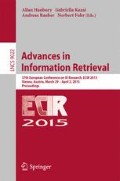Abstract
We present an empirical analysis of the effect that the gain and discount functions have in the correlation between DCG and user satisfaction. Through a large user study we estimate the relationship between satisfaction and the effectiveness computed with a test collection. In particular, we estimate the probabilities that users find a system satisfactory given a DCG score, and that they agree with a difference in DCG as to which of two systems is more satisfactory. We study this relationship for 36 combinations of gain and discount, and find that a linear gain and a constant discount are best correlated with user satisfaction.
Access this chapter
Tax calculation will be finalised at checkout
Purchases are for personal use only
Preview
Unable to display preview. Download preview PDF.
References
Al-Maskari, A., Sanderson, M., Clough, P.: The Relationship between IR Effectiveness Measures and User Satisfaction. In: ACM SIGIR (2007)
Allan, J., Carterette, B., Lewis, J.: When Will Information Retrieval Be ’Good Enough’? In: ACM SIGIR (2005)
Burges, C., Shaked, T., Renshaw, E., Lazier, A., Deeds, M., Hamilton, N., Hullender, G.: Learning to Rank Using Gradient Descent. In: ICML (2005)
Järvelin, K., Kekäläinen, J.: IR Evaluation Methods for Retrieving Highly Relevant Documents. In: ACM SIGIR (2000)
Kanoulas, E., Aslam, J.A.: Empirical Justification of the Gain and Discount Function for nDCG. In: ACM CIKM (2009)
Lee, J.H.: Crowdsourcing Music Similarity Judgments using Mechanical Turk. In: ISMIR (2010)
Sanderson, M., Paramita, M.L., Clough, P., Kanoulas, E.: Do User Preferences and Evaluation Measures Line Up? In: ACM SIGIR (2010)
Urbano, J., Downie, J.S., Mcfee, B., Schedl, M.: How Significant is Statistically Significant? The case of Audio Music Similarity and Retrieval. In: ISMIR (2012)
Author information
Authors and Affiliations
Editor information
Editors and Affiliations
Rights and permissions
Copyright information
© 2015 Springer International Publishing Switzerland
About this paper
Cite this paper
Urbano, J., Marrero, M. (2015). How Do Gain and Discount Functions Affect the Correlation between DCG and User Satisfaction?. In: Hanbury, A., Kazai, G., Rauber, A., Fuhr, N. (eds) Advances in Information Retrieval. ECIR 2015. Lecture Notes in Computer Science, vol 9022. Springer, Cham. https://doi.org/10.1007/978-3-319-16354-3_20
Download citation
DOI: https://doi.org/10.1007/978-3-319-16354-3_20
Publisher Name: Springer, Cham
Print ISBN: 978-3-319-16353-6
Online ISBN: 978-3-319-16354-3
eBook Packages: Computer ScienceComputer Science (R0)

